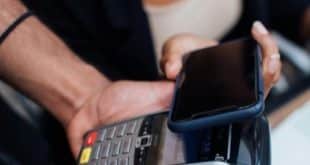The announcement late on Tuesday that Square Inc. struck a deal with coffee giant Starbucks Corp. for the first time puts Square, a specialist in bringing mobile-payment acceptance to small businesses and consumers, into the role of a more traditional card processor for a large national merchant. And at least for now, Starbucks has no plans to use Square’s famous cube-shaped card reader that plugs into smart phones and Apple Inc.’s iPad.
The multifaceted announcement includes the news that Square’s consumer-facing application, Pay With Square, will be integrated with Starbucks’ mobile payments app and usable at 7,000 Starbucks stores this fall. Pay With Square already enables consumers to walk into 75,000 locations and pay for their purchases without pulling out their mobile phone; instead the store clerk sees the customer’s photo on the point-of-sale system. Starbucks customers furthermore will be able to use the so-called Square Directory of merchants to find nearby Starbucks locations.
Also, Seattle-based Starbucks is investing $25 million in Square, whose other investors include Visa Inc., and Starbucks chairman and chief executive Howard Schultz is joining Square’s board of directors. Starbucks already is a major mobile-payments-accepting merchant with its bar-code-based smart-phone app and closed-loop prepaid card; a spokesperson says the company generates more than 1 million mobile-payment transactions per week in the U.S.
But the disclosure that San Francisco-based Square will process all of Starbucks’s U.S. credit and debit card transactions, not just ones from mobile devices, may be the most significant news out of the partnership. About 2 million businesses and consumers who sell goods and services currently accept Square. Besides bringing a marquee merchant into the Square fold, the announcement implies that Starbucks has changed merchant acquirers, though neither company would confirm that when asked by Digital Transactions News. Several sources who asked not to be named tell Digital Transactions News that Bank of America Merchant Services (BAMS), a joint venture of Bank of America Corp. and processor First Data Corp., is Starbucks’s incumbent acquirer. A BAMS spokesperson declined to comment. Banking giant JPMorgan Chase & Co.’s merchant-acquiring subsidiary Chase Paymentech is Square’s acquirer.
Nor would the companies disclose Starbucks’s discount rate for card transactions through Square, whose standard pricing is 2.75% of the sale for swiped transactions. Starbucks almost certainly is getting a lower rate than that, and a jointly issued press release suggests Starbucks’s processing expenses will be lower than they are now. “Square will process Starbucks U.S. credit and debit card transactions, which will significantly expand Square’s scale and accelerate the benefits to businesses on the Square platform, especially small businesses, while reducing Starbucks payment-processing costs,” says the release.
The Starbucks spokesperson tells Digital Transactions News by e-mail that the company paired up with Square for more than purely financial reasons. “As the leading mobile-payment platform in the U.S., Starbucks is constantly evaluating the payments landscape and anticipating what is next for consumers,” he says. “Starbucks believes in the values and vision of Square, and is pleased to begin working with Square to make the convenience of paying with Square more widely available to its customers.”
Payments researcher Rick Oglesby, a senior analyst at Boston-based Aite Group LLC, says he wouldn’t yet call Square a conventional payments processor, but with the Starbucks deal “they’re certainly competing in that space.” He notes that Square’s business with startups and small enterprises, while successful, “is pretty limiting. They’re going to need to have a large-merchant leg on the stool” to compete with the likes of PayPal Inc. and others that have blurred the line between physical and online payments.
The fact that Starbucks with its thousands of stores will retain its existing POS system and not use Square’s card reader or its Square Register product for the iPad is no surprise to mobile-payments consultant Todd Ablowitz, who says the system comes from International Business Machines Corp. “Why would they throw that stuff into the Dumpster?” he asks. But Ablowitz, president of Centennial, Colo.-based Double Diamond Group, says the payment operation could evolve. “It’ll be interesting to see what Starbucks does at new stores. If I were IBM, I’d be updating my pipeline.”
Square typically aggregates transactions and stands in as the merchant of record for card payments. Starbucks’s size, however, almost certainly means it will have its own merchant account with Square or an acquirer behind Square. Neither company would comment about that matter.
The Square-Starbucks deal also is notable for one thing it isn’t: a mobile-payments service based on near-field communication (NFC) technology. NFC is the foundation of Google Inc.’s Google Wallet and the nascent Isis joint venture of three leading telecommunications companies. But while it has many backers, NFC has encountered strong headwinds, including merchant resistance to its need for special terminals. PayPal did $4 billion in mobile volume last year, almost all of it non-NFC.
“NFC Takes a Shot in the Belly” is the headline Drew Sievers, chief executive of mFoundry, developer of the software behind Starbucks’ closed-loop mobile-pay operation, put over his blog post today reviewing the Starbucks-Square partnership.





